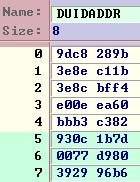Hi,
My customer did the Fletcher Checksum with UID,
But the results told us that some chips using big endian mode , and others using little endian mode.
Could TI explain which mode using in F28377D?
Or any wrong code with below calculate algorithm program?
device 1 UID:
uint16_t UID_Data1[]={0x2c6d ,0x81b9 ,0x1656 ,0x472e ,0x4899 ,0xfa9a ,0x4e7f ,0x9e3b ,0x51a8 ,0xda30 ,0x2ca5 ,0xcb9e ,0x0008 ,0x64e5 ,0x33c2 ,0xc4a4};
uint16_t UID_Data2[]={0x81b9 ,0x2c6d ,0x472e ,0x1656 ,0xfa9a ,0x4899 ,0x9e3b ,0x4e7f ,0xda30 ,0x51a8 ,0xcb9e ,0x2ca5 ,0x64e5 ,0x0008 ,0xc4a4 ,0x33c2};
calculate result:
UID_CRC1 unsigned long 0x4804C4A4 (Hex)
UID_CRC2 unsigned long 0x33C2C4A4 (Hex)
device 2 UID:
uint16_t UID_Data3[]={0x9dc8 ,0x289b ,0x3e8e ,0xc11b ,0x3e8c ,0xbff4 ,0xe00e ,0xea60 ,0xbbb3 ,0xc382 ,0x930c ,0x1b7d ,0x0077 ,0xd980 ,0x3929 ,0x96b6};
uint16_t UID_Data4[]={0x289b ,0x9dc8 ,0xc11b ,0x3e8e ,0xbff4 ,0x3e8c ,0xea60 ,0xe00e ,0xc382 ,0xbbb3 ,0x1b7d ,0x930c ,0xd980 ,0x0077 ,0x96b6 ,0x3929};
calculate result:
UID_CRC3 unsigned long 0x392996B6 (Hex)
UID_CRC4 unsigned long 0x36C596B6 (Hex)
calculate algorithm program as below:
--------<declare>--------------------------------------
uint32_t fletch32(uint16_t const * pu16Data, uint32_t length, uint32_t seed);
// UID 0x000703C0 ==>93EEBC4E 5C64CAE9 7597B4B0 4DF20580 0B333C18 650D013C 000D1F39 62E7C220
uint16_t UID_Data2[]={0xBC4E ,0x93EE ,0xCAE9 ,0x5C64 ,0xB4B0 ,0x7597 ,0x0580 ,0x4DF2 ,0x3C18 ,0x0B33 ,0x013C ,0x650D ,0x1F39 ,0x000D ,0xC220 ,0x62E7};
uint32_t UID_CRC=0,seed = 0xFFFFFFFF;
-----<main()>-----------------------------
UID_CRC=fletch32(UID_Data2,14,seed);
------<function>---------------------------------------------
//seed = 0xFFFFFFFF;
uint32_t fletch32(uint16_t const * pu16Data, uint32_t length, uint32_t seed)
{
uint32_t u32Sum1 = 0xFFFFU & seed, u32Sum2 = 0xFFFFU & (seed >> 16U);
uint16_t u32Index, idx;
uint16_t data;
for(u32Index=0U;u32Index < length; u32Index++)
{
idx = u32Index^1; // little endian mode otherwise use u32Index only
data = pu16Data[idx];
u32Sum1 += data;
u32Sum1 = (u32Sum1 >> 16U) + (u32Sum1 & 0xFFFFU);
u32Sum2 += u32Sum1;
u32Sum2 = (u32Sum2 >> 16U) + (u32Sum2 & 0xFFFFU);
}
return ( (u32Sum2 << 16U) | u32Sum1);
}
best regards,
Simen




